#specifically made page 7 smaller than the other pages. I don't know why.
Text
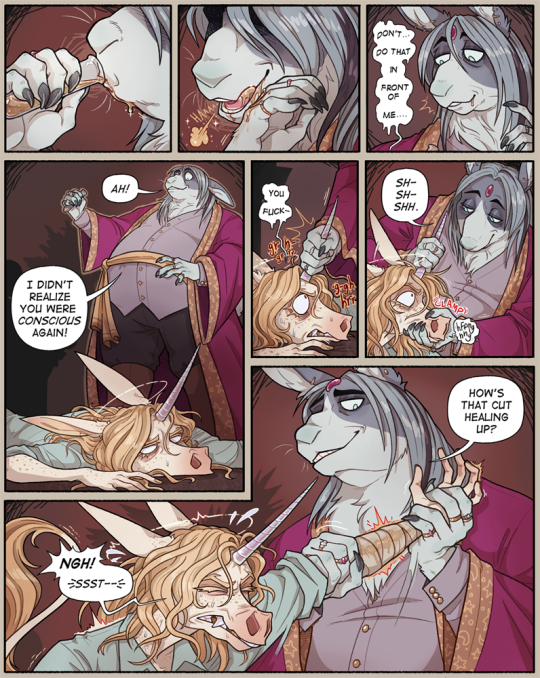


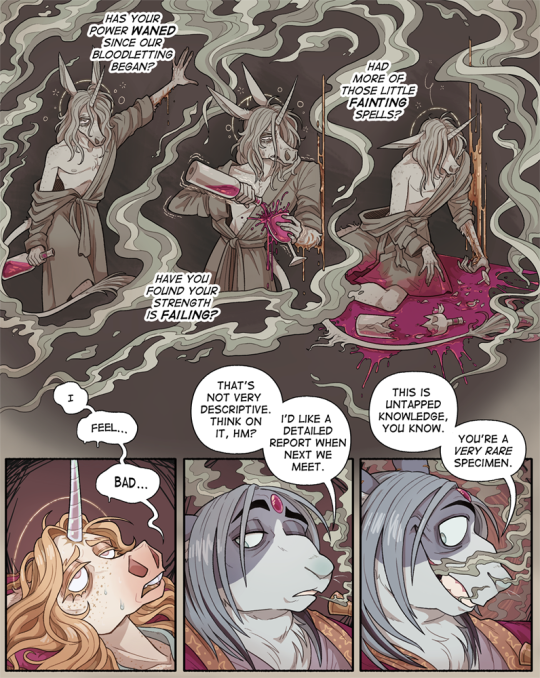
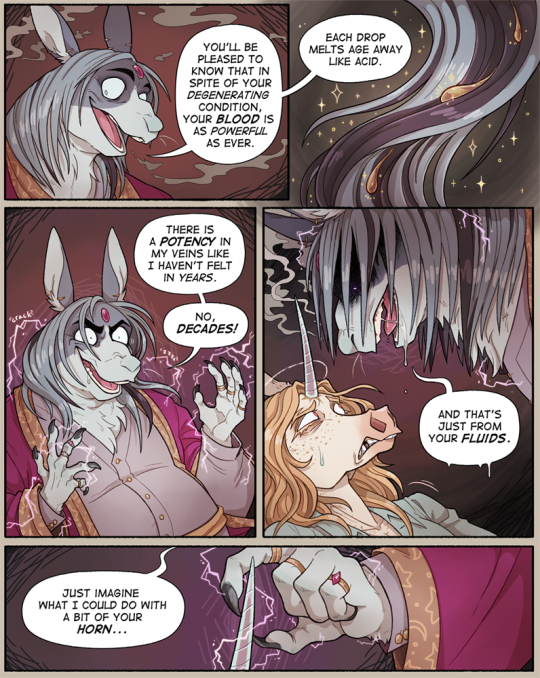

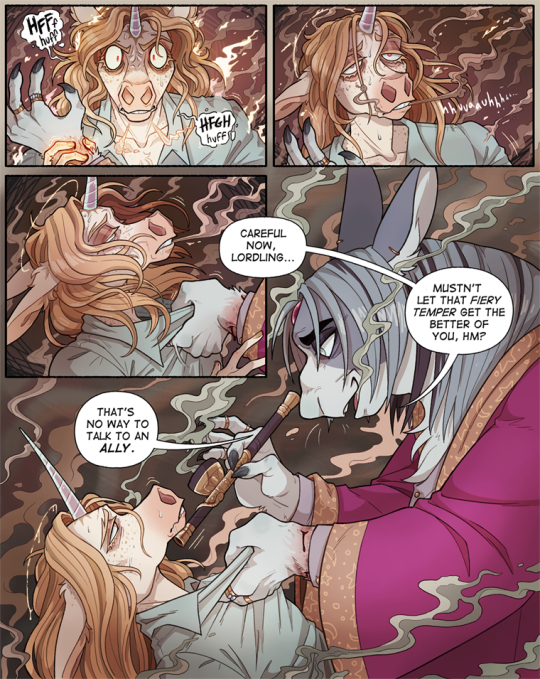
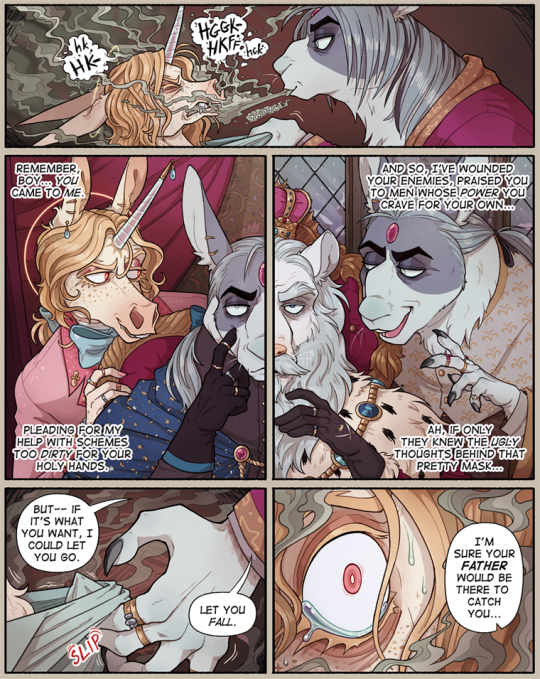
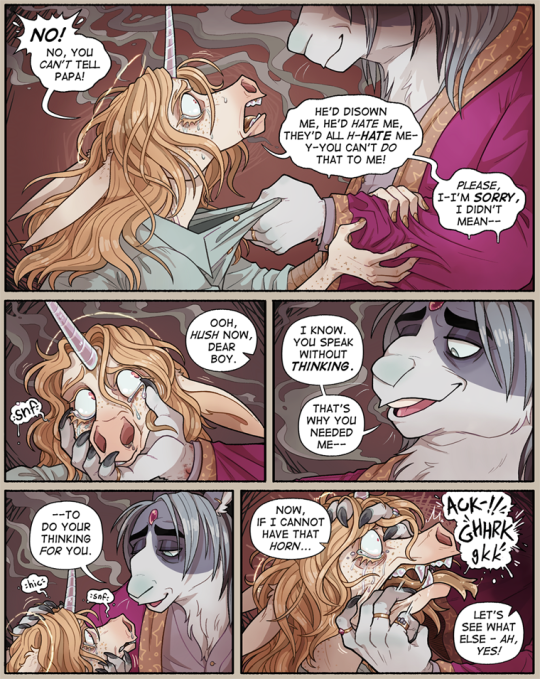
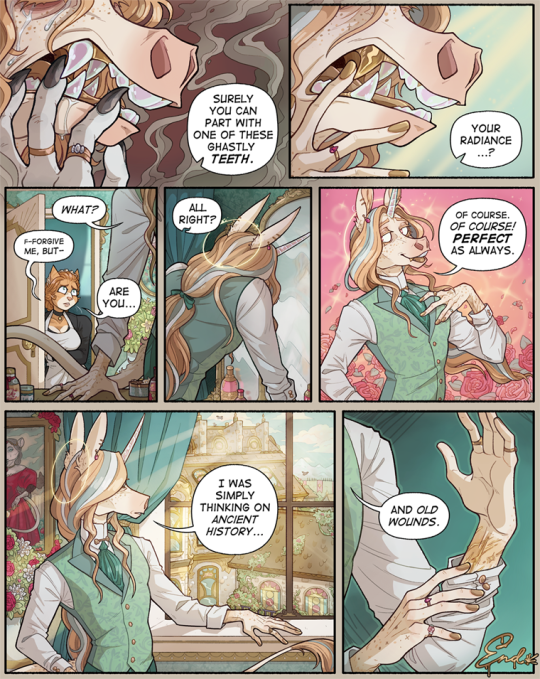
Old Wounds
So excited to finally post this comic collab between @chocodile and I! She did the initial thumbnails and colors and provided the evil wizard rabbit, and I did the script, sketch and lines and provided the pathetic prettyboy unicorn.
Old Wounds is a look into the alliance between Duke Hyden and Lord de Luxe, an alliance that winds up being a mere ploy for Hyden’s experimentation with unicorn blood and leaves Ambroys feeling rather drained (and often unconscious on Hyden’s floor). It takes place towards the end of their “friendship”, after there’s some serious bad blood between the two - bad blood that sustains a centuries-long grudge.
(Well - I say “bad blood,” but Hyden seems to think the blood is juuuust fine.)
#sorry if you saw me upload and delete and re-upload this - tumblr wouldn't let me post this unless I#specifically made page 7 smaller than the other pages. I don't know why.#this is such a functional website#chocodile says ambroys is a poor little meow meow in this#a poor little neigh neigh if you will#but I promise outside of this circumstance he's a horrible awful git with barely restrained rage issues#and there's a reason he has to work with hyden of all people#it's just that he's a coward#and Hyden is the Alpha Villain around these parts#ANYWAYS... hope this post works this time and I hope you guys like it! we worked very hard on this! :'D#comics#ambroys#amaranthine#my draws#furry
2K notes
·
View notes
Note
4, 7, 11, 13, 16, 22, 31, 36, 40 ⚰️
oh my god that's so many. i am sorry for what i am about to unleash.
4. Say you’re recommending the show right now, how would you pitch it?
it REALLY depends who i'm recommending it to but the main points i would hit is that it's good, it's short and it's about vampires in the worst relationship ever. i do make sure to specifically say the relationship is abusive especially if i'm talking to someone i think would be into it for the romance, and i usually also say that it's pretty trigger-heavy. for some people it's a deterrent but for others it's a plus, so. i also sometimes describe the vampire element as 'what if you lived forever but also had a mental illness' which i think is fun.
7. If you read the book, what are your favorite changes from page to screen?
Ohh i have many. the obvious ones like louis and claudia (but louis especially) being black, the time period change, making the domestic abuse textual, daniel being old and the original interview having taken part in the past, etc. but in terms of smaller changes, i think it has to be the baby-trapping switch; giving claudia and louis the ability to speak telepathically was a stroke of absolute genius it's so so good and interesting and creepy
11. Has your favorite episode remained the same since you first finished the season?
yup, it's the pilot! tho eps 4 and 5 were strong contenders.
13. What was your favorite piece of music from the first season’s OST?
it's vicious. so fucking good inject those violins right into my veins
16. Do you have a favorite piece of art (book, movie, painting) that’s referenced or featured in the show?
very interesting question. i think it's probably the francis bacon triptych (three studies for figures at the base of a crucifixion)
22. Who's your favorite character? Why?
it's louis!!!!!!!! ldpdl forever and ever <3 i'll keep it simple and say i love a character full of nothing but contradictions, i love a delusional man, i love a man who suffers, and i think jacob anderson might be the epitome of human beauty
31. What’s your most anticipated season two storyline?
the storyline i'm most excited about is the souring of claudia and louis' relationship because i think it's such an interesting part of the book and i love it when characters act horribly. and i want claudia specifically to be so so horrible <3 and other than that, not a storyline exactly but i'm so so psyched to see the vampire theatre like. i'm a big theatre enjoyer. throw in any sort of puppetry and you'll win me forever
36. What’s an unpopular opinion you have?
oh man. i'll be honest i don't really know what's considered unpopular these days, i only follow a handful of people from the fandom and they tend to be the ones i share opinions with, but that doesn't mean those opinions are popular. i guess a truly unpopular opinion of mine is that i don't care about lestat/armand as a ship and i don't want the vampires to be poly or anything like that. insane drama jealousy and divorce forever <3 i guess another opinion that might be unpopular with hardcore book fans is that i don't care if lestat is redeemed or not, i have faith in the writers and i think either way could be interesting and that's ultimately what i care about. in general i guess i just don't care about book accuracy at all.
40. If you made any fanworks of your own, what are your personal favorites? Throw yourself some flowers!
well uhh i have made fanworks but i have a separate account for them. if we are mutuals and you are interested you are welcome to send me a dm and i'll link you tho <3
#thank you for asking all of this i hope the answers are interesting to you !!!#and if not then i have at least entertained myself#also in general mutuals are always welcome to jump into my dms i struggle to initiate but i love to chat with fellow freaks#iwtv#my posts
2 notes
·
View notes
Note
Hello Olive! 👋🏼
I don't know if you're still taking requests but I would love your help ! 🙃
So in multiple POV books, sometimes two scenes from two different POVs happen simultaneously. Usually, it’s much easier to portray this in movies and tv shows by cross-cutting scenes and interspersing them using the ocean's novel formula I think, to create suspens and tension in fight scenes or backstories parallelism.
In a book, my wip for example, I find it much difficult to convey the same feelings and tension in words.
Any tips and/or guidelines plz?
Could you plz add an example of your own creation just to see the result something like a cheat sheet /not that I'm using it, just to understand how I can go through it/?
Thanks in advance!!!
💕
Hey anon!
Quick disclaimer - I write in single pov, so the advice below is based off of what I've seen, and how I would tackle it theoretically if it was something I was thinking of writing something like this. Similarly, because multi-pov is not something I particularly enjoy writing in (personal preference, nothing inherantly wrong with it), and it would probably take me several hours to produce a new work that was of much quality, I'm not going to include my own final example, though there are little tidbits below, as they became relevant. Also, this got long, hence the read more.
Alrighty into the good stuff!
So the first thing to consider is why it seems easier to pull off more rapid pov switches in movies. The main thing is grounding. Oftentimes, movies will put characters in situations where their background is at least somewhat different, and sometimes they'll mess with the music a bit (though not always). This makes it really easy for the audience to place where the characters are in a split second, which in turn means producers don't have to spend a ton of time re-establishing where each person is. This helps to keep tension up.
The thing with books is that we only have words to work off of - no visuals to provide readers with instant grounding. That means if you want to pull it off well, quickly grounding readers every shift is essential.
Parallel backstories are probably going to be a lot trickier to pull off in writing than they are in movies. The reason they work in cinima is that a) like we mentioned before it takes a lot less time to do the whole grounding thing, b) parallels are a lot more aesthetically pleasing when you can see them, but they can come across as repetitive when read, and c) dramatic time shifts like flashbacks are easier to pull off in movies where you can see that characters are visibly younger, but they tend to be disliked by readers, as it tends to disrupt forward momentum.
Intercutting stories with regards to backstory pretty much means you need to be right there with your character to see the backstory unfold. Which means flashbacks.
In some books, flashbacks are a key part of the narrative, especially if it's in a story where time is more fluid. However, if you only have one or two cases where you need to jump back, it has a much greater potential to look lazy. More often than not, it's generally considered a stronger story if you can find a way to intersperse backstory throughout the story.
It also means it's often more interesting to show their backstories, but let the audience come to the conclusion on their own that they're actually kinda parallel, and see how that affects how the characters turn out.
The next thing to consider when maintaining tension is pacing - the pull and push of scenes or even smaller beats that keeps a story dynamic. Even within faster scenes, you have places where you still make your audience wait, or else it'll be over too quick. Slower scenes still need to have some faster bits to maintain forward movement.
Each time you switch povs, you are creating a little bit of waiting time for the "non-active" pov. This is not a guarantee to establish tension, but it does help. To balance it out, make sure what's happening on the page keeps moving. Give your characters time on page to rest sometimes, but largely keep moving forward.
Another thing with pacing for multi-pov is that the longer you bench a certain pov, the longer it takes to get back in their head. So make sure to give all of your pov characters similar page time. They don't have to go in a specific rotation, but they should be balanced.
Some thoughts about making pov shifts that don't disrupt the forward momentum as much:
1 - Establish location before it becomes vital. This is actually something that is key to a lot of action scenes, because nothing breaks tension and immersion like the author saying "oh wait here's this detail that i forgot to tell you until now." Basically, set up the general layout and other necessary details when things are calmer, so the reader has a chance to set up a mental map of the place, and when things are more tense, keep readers spacially grounded by referencing what you've already established.
2 - To make it clear that things are happening at the same time, use references that can pop up in both povs. For example, maybe all the lights go out, or maybe in one scene, a character shoots a gun, and in the next (because pov switch), a character hears a gunshot going off. You're going to want a time, place, and pov reference right away to ground your readers (if you're doing third person, the pov reference could just be saying that person's name), and you're going to want to have a few space and time references as you go through the scene, so that when you do your next pov shift, readers can slot it into the correct chronological spot.
3 - Similarly, make sure that timing matches up. Your audience will notice these things. If two reference points in one pov happen three minutes apart in world, the same reference points have to take three minutes in the other pov too. Something that I HIGHLY suggest is before splitting up your povs, create an outline of what happens from an omnicient point of view, so you can make sure to get characters to the right place in the right amount of time
4 - You don't have to make each character's scene start and stop at the same in world time. This is what makes the aforementioned time references so important. However, if you're going to skip something like a character going from the kitchens to the dungeons because nothing really happens, you have to show that intention before you cut away, or else it's going to take a lot longer to re-establish where a character is.
5 - To keep tension up, mini cliffhangers can work in your favor. Maybe a character gets captured and they're about to discover who his captor is, but then you cut to the other character in a cell, trying to pick the lock before anyone notices.
6 - Remember that in situations like these, your readers will often have a better idea of the overall picture than your characters. If you reveal something in one pov, remember that you don't have to reveal it again in the other, unless it's a means to reveal more necessary information. Going to the example from point 5, maybe in the next scene, the captured character figures out that it's a trap, and that if anyone else walks through the door it will blow up. But the lockpicking one doesn't know that. So she's trying to get there and rescue him. Tension is created both because she has to do it without getting caught, but we as readers would know that if she manages to follow through, it will be devastating. The trick is that the thought shouldn't really cross her mind, because she has no way of knowing it.
7 - Choose your povs with purpose. Does the reader need to know something for the chain of events to keep making sense? Which pov will be privvy to the most knowelege? Does there need to be something ominous (like maybe a body falls past a window), but revealing why that happened would kill some of the suspense? Which pov would reasonably be near the window, but wouldn't be able to see or hear what was happening above? Also consider where it makes sense to bring in povs that haven't been in the spotlight for a little while.
8 - Remember that you can't cut as fast between povs at the same speed you can in movies because of that whole grounding issue. Give each pov at least a full scene to themselves, and sometimes a few so that we can actually see things unfolding, and then switch. If you create things that other povs can reference, even if only in passing, it will still maintain the experience of things happening at the same time.
Hopefully all of this made sense and gives you a better jumping-off point. Happy writing!
#writing#writing advice#writeblr#writing reference#multi pov#action scenes#tension#suspense#writing tips#ask#writing questions#dual pov#long post#movies#fight scenes#escape scenes#spacial grounding#olive's writing vibes
51 notes
·
View notes
Text
Asimov's Science Fiction (March/April 2017)

Digging into my backlot of science fiction magazines. A mixture of verse and stories. I've only reviewed and rated the stories. This particular issue is the 40th Anniversary one! 3.8 out of 5
"Soulmates.com" by Will McIntosh
Daniel wants someone to share his life with, to love and be loved by. When he meets Winnie through a dating app, he thinks she could be the one almost immediately. Emily, his former girlfriend and current best friend, is more suspicious, doing a deep dive on who Winnie could be. Which, considering they never meet in person despite Winnie being in Atlanta and Daniel in Athens, not that long a drive, is valid. Starts extremely slowly, assumingly to establish the characters. Not my favorite way as most writers don't do a good job at it. I'm not entirely certain that this is actually science fiction, despite the use of Artificial Intelligence. As to Daniel, I found him to be incredibly childish, blind, immature, and boring. He learned absolutely nothing from his experience. I struggled to complete this novella. 2.5 out of 5
"Number Thirty-Nine Skink" by Suzanne Palmer
It started simply enough, an expedition designed to bring life in balance to an empty planet. Then the humans left suddenly, leaving Mike willingly behind with Kadey whose programming makes the creatures populating the area. When Mike dies of cancer, Kadey continues her work. Until the night something changes. Poor Kadey, struggling with loneliness, possibly incomplete programming, and the knowledge hidden from her regarding why the humans left. Sad, yes, but with a more hopeful ending that is also a beginning. Lovely story, so well written. 4.5 out of 5
"Three Can Keep a Secret..." by Bill Johnson & Gregory Frost
A convoluted tale of assassins, misdirection, love, greed, and con-artistry with an almost noir feel to it. It's almost impossible to give a synopsis that isn't chockful of spoilers. The first person narrator isn't totally reliable, but still intriguing in what he shares. I loved this more than I expected with this strange little story. FYI, in case you don't know, the title is from an old saying.
Three can keep a secret if two of them are dead. 4.5 out of 5
"The Ones Who Know Where They Are Going" by Sarah Pinsker
A child must suffer so the city can be happy, or so they say. One particular child is taken from her mother, locked away in the dark with no social interaction beyond the delivery of food. As time passes, language is lost and memories of a happier time begin to fade. Then one day the door isn't shut tightly and the child gets out of the tiny dark room. She crawls up the stairs, each step bringing back a particular memory, heading for freedom. But at what cost? Rip my heart out, why don't you? Two and a half pages of the most gut-wrenching narrative. The tightly woven writing is painfully descriptive. And the ending! Oh, the ending. I just cannot deal with it. 5 out of 5
"Invasion of the Saucer-Men" by Dale Bailey
Teenagers have been foiling alien invasions for some time. After all, the adults are either locked in their homes consuming television or would dismiss the very idea of aliens. The newest landing of a flying saucer bonds together teens out at the local make-out point. Per the author, his idea was to take the cheesy sci-fi and horror movie titles of the 1950s and treat the core idea with some emotional and thematic nuance. Here we have a group of teen archetypes, from the football star to the nerds to the beauty. There are also the followers that are always found in high school. This brings back memories of too many cheesy nights at the drive-ins in my county. I've always found my sympathies fell with the aliens most of the time, faced with humans whose first response to the unknown was always violence. Horrible ending to this story. Horrible. CW: extremely graphic attack. 3 out of 5
"Kitty Hawk" by Alan Smale
After receiving word of her brother's death, Katharine Wriht travels from Ohio to North Carolina to help her other brother. Instead of Orville preparing to pack up for the trip home with his beloved
brother's body, he is trying to continue with the flight experiments that killed Wilbur. Katharine finds herself engaged in helping, even learning to fly herself. This is a complete AU of the Wright Brothers and the birth of flight, through World War I and the suffrage movement. The writing is evocative of the time period and the dangers of experimental flight. I don't know why it didn't click with me, but I struggled quite a bit in reading this imaginative tale. I can see others enjoying this greatly, just not me. 3 out of 5
"Cupido" by Rich Larson
Marcel is a genius at chemistry. He came up with a way to make pheromones specific to the pair he's paid to bring together, either by one of the potential couple or by a third party. The majority of the money he charges goes to pay for his grandmother's colon cancer treatment. As word gets around, he finds himself moving to smaller cities to avoid identification. As yet, what he does isn't illegal. He didn't expect to find himself attracted to his potential mark. Frankly, I don't consider this to be science fiction at all. The science is already viable. Add the consent issues which would be called dubcon (dubious consent) and I'm too busy cringing to enjoy. In my mind, Marcel is anything but a hero. 3 out of 5
"A Singular Event in the Fourth Dimension" by Andrea M. Pawley
Olive was removed from the reducer pile, adopted by a childless couple to help stave off loneliness. Now that the second grandmother is living with them and Mama was pregnant, Olive is worried that she will be sent back to the pile, no longer needed. A loving, imaginative little android who believes in fairy dust, even if the fairies never seem to do anything magical like in the stories. Love doesn't have to be limited to just humans or blood relations. Sweet and touching. 4.5 out of 5
"The Wisdom of the Group" by Ian R. MacLeod
There are theories and studies about group-think, how certain groups can intuit a trend or coming situation without any real knowledge. With the right group, the members could get wealthy or probably save the world, depending on their inclination. Samuel has been part of such a group since brought in by his professor while still in university. Now, years later, Samuel is wealthy, has a liv-in lover, three dogs with unfortunate names, and a gorgeous house in Washington state. But something is wrong, something that seems to be originating from Samuel. The response is usually to cut the wrong out of the group. A complicated basis for a disturbing story. I had to sit on this one for a while in order to determine what I felt about it. Definitely strong writing, could almost be considered psychological horror. I don't know if I would ever say that I liked it, but I recognize the work done and the uniqueness of the story. 3.5 out of 5
"After the Atrocity" by Ian Creasey
Abu Hameed, the terrorist behind the attack that left ten thousand people dead, has also died during interrogation. The solution? A machine that can make exact copies, complete with memories, of an individual. Violet Ruiz, operator and creator of the machine, even made a duplicate of herself in order to work 24/7. As Hameed's copies die during the enhanced interrogation, more copies are needed. Soon Violet II wonders about the ethical implications. Well thought out consideration of just how far a nation is willing to go in search of revenge wrapped in the disguise of intel. Patriot Act, enhanced interrogation the Greater Good, dismantling both Habeas Corpus and the Geneva Convention, anyone? 4 out of 5
"Goner" by Gregory Norman Bossert
In order to explore space, humans had to be converted from flesh into nanotechnology based creatures. The pilots call themselves Goners. Char's best friend's father is a Goner. Already fascinated with the idea of flying, Char uses a sliver of Pilot Clark to begin changing. While this is complete in itself, the story also begs for more. What is happening to Char? Will he be allowed to live his dreams despite his age? S fascinating a concept. 3.5 out of 5
"We Regret the Error" by Terry
Bisson
A series of news corrections from the future. So many corrections, even some corrections of corrections. Taken individually, these are amusing. Pieced together, there is a much deeper story playing out. Oh, and a nice dig at Disney's well-known history of not paying some of their artists for their work. 3 out of 5
"Tao Zero" by Damien Broderick
Teenagers, incredibly smart ones, have unprotected sex after winning $370 million in the Mega Millions lottery. The celebration leads to a child, the narrator, and the money to try to trap the Tao, the Way that cannot be named, inside a machine. I tried, I really tried to read this without success. After rereading the first two pages over and over in an attempt to struggle through, I put the story aside, hoping to pick it back up when refreshed. Didn't work. DNF
0 notes